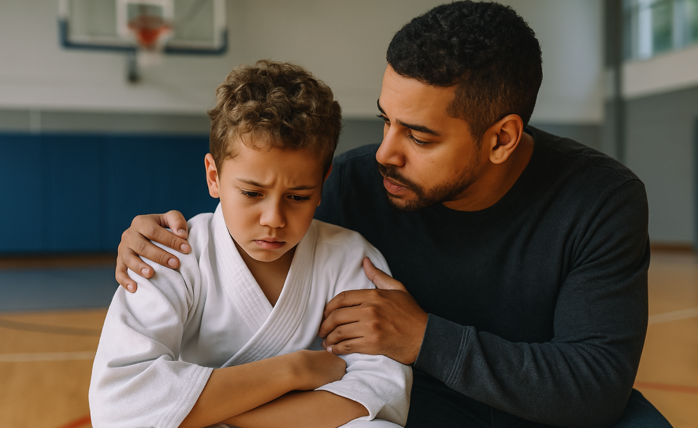Life
How Sports Quietly Build Kids’ Emotional Intelligence And Why It Matters for Life
Sports create a natural loop of awareness and action that kids carry into real life

A missed shot in basketball. A tumble during a gymnastics routine. A tough loss in karate sparring. These moments can feel huge to a child, sparking frustration, embarrassment, or even tears.
But here’s the good news: Sports give kids the perfect environment to practice staying calm under pressure, bouncing back after setbacks, and even turning mistakes into motivation.
Parents often sign their kids up for sports to keep them active and teach teamwork. What many don’t expect is how these activities also shape emotional intelligence.
Whether it’s soccer, baseball, or karate, kids who learn to control their emotions on the field or mat build skills that carry over into school, friendships, and eventually their careers.
How Movement Connects to Emotions
Emotions don’t just happen in the mind; they show up in the body. A nervous child about to compete might feel their heart race, their hands sweat, or their shoulders tense. These physical signals are important because they give kids a chance to notice and respond.
Sports are great at bringing these feelings to the surface in a safe way. In karate, for example, children practice breathing techniques to stay calm before a sparring match. They learn to reset their posture and focus their energy, even after making a mistake.
This immediate feedback, feeling an emotion, seeing how it affects their performance, and adjusting on the spot, helps kids build self-awareness faster than almost any other environment.
And these skills don’t stay in the gym. A child who learns to breathe and refocus before throwing their next kick or hitting their next ball often uses the same approach during a math test or a disagreement with a friend.
Sports create a natural loop of awareness and action that kids carry into real life.
Sports Teach Respect and Empathy
One of the hidden gems of sports like karate is how much respect is built into the practice. Bowing to an opponent, waiting for your turn, and listening carefully to your instructor aren’t just formalities; they teach patience, humility, and empathy.
When kids partner up for drills or practice, they have to adapt to someone else’s style, pace, and comfort level. That creates empathy because they see the sport from another person’s perspective.
They also learn accountability, since a careless move doesn’t just affect their performance, but their partner’s experience, too.
Even losing is reframed as a lesson. Instead of seeing defeat as failure, kids learn to see it as feedback. That mindset, “I didn’t lose, I learned”, is powerful when applied to school, friendships, and future careers.
Family-focused sports programs amplify this even more, giving parents and kids the chance to learn side by side, often strengthening communication and respect at home.
Emotional Control Is a Superpower in Life
Many researchers believe that emotional intelligence often predicts success better than IQ. Someone who can handle stress, empathize with others, and lead calmly often performs better than someone who just has raw knowledge.
Children who develop emotional control early are more likely to handle peer conflict gracefully, stay calm under academic pressure, and take on leadership roles with confidence.
These are the same kids who grow into resilient adults, whether they become entrepreneurs, teachers, or community leaders, because they already have practice keeping their emotions in check while working toward a goal.
And for future entrepreneurs, that skill is gold. Startups and businesses often face high-stress situations, unexpected setbacks, and moments where quick, clear thinking is crucial.
A kid who once learned to breathe and focus after losing a game is better equipped years later to make smart business decisions under pressure.
Winning Is Nice, but Growth Is Better
Parents often sign kids up for sports hoping for trophies, medals, or the thrill of competition. While those moments are exciting, the real value is what happens behind the scenes: kids learning patience, discipline, and perseverance.
Soccer, for example, teaches players to stay focused even when the game doesn’t go their way. A missed goal or a tough loss becomes motivation to train harder, communicate better, and trust their teammates.
The emphasis shifts from winning every game to improving with every practice and match. Kids who internalize that mindset, progress over perfection, tend to approach life challenges with the same calm determination.
That means when a child faces a tough exam, a challenging friendship, or even their first job interview, they’ve already learned how to stay composed and push forward. Sports give them a safe space to fail, learn, and try again until those habits become second nature.
The Ultimate Win: Lifelong Confidence
The biggest win kids get from sports isn’t measured in points or medals. It’s the quiet confidence that comes from knowing, “I can handle this.”
Whether that “this” is a tough homework assignment, a disagreement with a friend, or a high-pressure moment in adulthood, kids who learn to control their emotions early are prepared to face challenges head-on.
For parents, the takeaway is simple: Think of sports not just as physical activity but as emotional training. Whether your child becomes an athlete, an entrepreneur, or something else entirely, the ability to stay calm, focused, and resilient is a lifelong advantage.
The Takeaway That Lasts a Lifetime
Sports are more than games; they’re life lessons in motion. They teach kids how to keep cool in the moment, communicate effectively, and bounce back from setbacks.
For parents, encouraging participation isn’t just about keeping kids busy or fit. It’s about giving them tools for success that extend far beyond the mat, the field, or the court.
When children learn to control their emotions through sports, they gain something far more valuable than a trophy. They gain the confidence and resilience to thrive in every area of life — and that’s a success story worth celebrating.
Life
9 Harsh Truths Every Young Man Must Face to Succeed in the Modern World
Before chasing success, every young man needs to face these 9 brutal realities shaping masculinity in the modern world.

Many young men today quietly battle depression, loneliness, and a sense of confusion about who they’re meant to be.
Some blame the lack of deep friendships or romantic relationships. Others feel lost in a digital world that often labels traditional masculinity as “toxic.”
But the truth is this: becoming a man in the modern age takes more than just surviving. It takes resilience, direction, and a willingness to grow even when no one’s watching.
Success doesn’t arrive by accident or luck. It’s built on discipline, sacrifice, and consistency.
Here are 9 harsh truths every young man should know if he wants to thrive, not just survive, in the digital age.
1. Never Use Your Illness as an Excuse
As Dr. Jordan B. Peterson often says, successful people don’t complain; they act.
Your illness, hardship, or struggle shouldn’t define your limits; it should define your motivation. Rest when you must, but always get back up and keep building your dreams. Motivation doesn’t appear magically. It comes after you take action.
Here are five key lessons I’ve learned from Dr. Peterson:
-
Learn to write clearly; clarity of thought makes you dangerous.
-
Read quality literature in your free time.
-
Nurture a strong relationship with your family.
-
Share your ideas publicly; your voice matters.
-
Become a “monster”, powerful, but disciplined enough to control it.
The best leaders and thinkers are grounded. They welcome criticism, adapt quickly, and keep moving forward no matter what.
2. You Can’t Please Everyone And That’s Okay
You don’t need a crowd of people to feel fulfilled. You need a few friends who genuinely accept you for who you are.
If your circle doesn’t bring out your best, it’s okay to walk away. Solitude can be a powerful teacher. It gives you space to understand what you truly want from life. Remember, successful men aren’t people-pleasers; they’re purpose-driven.
3. You Can Control the Process, Not the Outcome
Especially in creative work, writing, business, or content creation, you control effort, not results.
You might publish two articles a day, but you can’t dictate which one will go viral. Focus on mastery, not metrics. Many great writers toiled for years in obscurity before anyone noticed them. Rejection, criticism, and indifference are all part of the path.
The best creators focus on storytelling, not applause.
4. Rejection Is Never Personal
Rejection doesn’t mean you’re unworthy. It simply means your offer, idea, or timing didn’t align.
Every successful person has faced rejection repeatedly. What separates them is persistence and perspective. They see rejection as feedback, not failure. The faster you learn that truth, the faster you’ll grow.
5. Women Value Comfort and Security
Understanding women requires maturity and empathy.
Through books, lectures, and personal growth, I’ve learned that most women desire a man who is grounded, intelligent, confident, emotionally stable, and consistent. Some want humor, others intellect, but nearly all want to feel safe and supported.
Instead of chasing attention, work on self-improvement. Build competence and confidence, and the rest will follow naturally.
6. There’s No Such Thing as Failure, Only Lessons
A powerful lesson from Neuro-Linguistic Programming: failure only exists when you stop trying.
Every mistake brings data. Every setback builds wisdom. The most successful men aren’t fearless. They’ve simply learned to act despite fear.
Be proud of your scars. They’re proof you were brave enough to try.
7. Public Speaking Is an Art Form
Public speaking is one of the most valuable and underrated skills a man can master.
It’s not about perfection; it’s about connection. The best speakers tell stories, inspire confidence, and make people feel seen. They research deeply, speak honestly, and practice relentlessly.
If you can speak well, you can lead, sell, teach, and inspire. Start small, practice at work, in class, or even in front of a mirror, and watch your confidence skyrocket.
8. Teaching Is Leadership in Disguise
Great teachers are not just knowledgeable. They’re brave, compassionate, and disciplined.
Teaching forces you to articulate what you know, and in doing so, you master it at a deeper level. Whether you’re mentoring a peer, leading a team, or sharing insights online, teaching refines your purpose.
Lifelong learners become lifelong leaders.
9. Study Human Nature to Achieve Your Dreams
One of the toughest lessons to accept: most people are self-interested.
That’s not cynicism, it’s human nature. Understanding this helps you navigate relationships, business, and communication more effectively.
Everyone has a darker side, but successful people learn to channel theirs productively into discipline, creativity, and drive.
Psychology isn’t just theory; it’s a toolkit. Learn how people think, act, and decide, and you’ll know how to lead them, influence them, and even understand yourself better.
Final Thoughts
The digital age offers endless opportunities, but only to those who are willing to take responsibility, confront discomfort, and keep improving.
Becoming a man today means embracing the hard truths most avoid.
Because at the end of the day, success isn’t about luck. It’s about who you become when life tests you the most.
Change Your Mindset
The Four Types of Happiness: Which One Are You Living In?
Most people chase success only to find emptiness, this model reveals why true happiness lies somewhere else.

In a world driven by rapid technological growth and constant competition, many people unknowingly trade joy for achievement. (more…)
Change Your Mindset
The Secret Daily Routines Behind History’s Most Brilliant Thinkers
Uncover the daily rituals and hidden habits that powered history’s most brilliant minds to success.

Why Daily Rituals Matter
Every great achiever has one thing in common: discipline. Behind the novels, inventions, discoveries, and masterpieces are small, consistent habits repeated daily. (more…)
Finances
From Debt to Financial Independence: A Practical Roadmap Anyone Can Follow
It’s about having control over your money and not letting money control you.

The 21st century has brought incredible opportunities but also new challenges. Rapid technological change, global uncertainty, and shifting lifestyles have made many people think more deeply about financial freedom. (more…)
-

 Success Advice4 weeks ago
Success Advice4 weeks agoInside the TikTok Resume Hack That’s Fooling Recruiters (For Now)
-

 Change Your Mindset3 weeks ago
Change Your Mindset3 weeks agoThe One Leadership Habit That Separates the Great From the Forgettable
-

 Personal Development3 weeks ago
Personal Development3 weeks agoThis Silent Habit Might Be Sabotaging Your Career
-

 Business2 weeks ago
Business2 weeks agoWhy Your E-Commerce Fulfilment Is Probably Broken (And How to Fix It)
-

 Shift Your Mindset2 weeks ago
Shift Your Mindset2 weeks ago11 E’s That Define Every Great Leader And Why Most People Miss Them
-

 Did You Know1 week ago
Did You Know1 week agoThe Success Patterns You Inherited (And Didn’t Notice)
-

 Business1 week ago
Business1 week agoThe Hidden Money Pit in Your Operations (and How to Use It)
-

 Entrepreneurs4 days ago
Entrepreneurs4 days agoThe Essential Skills Every Entrepreneur Needs In 2026













